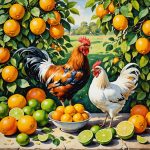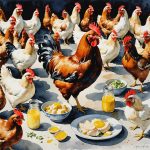As backyard chicken enthusiasts look to diversify their flock’s diet, one question often arises – do chickens eat rhubarb? This leafy perennial plant is a popular choice for pies and jams, but can it also be a nutritious addition to a chicken’s menu? Let’s explore teh answer to this intriguing poultry puzzle.
Table of Contents
Can Chickens Eat Rhubarb safely?
chickens can eat rhubarb occasionally, but it is crucial to take precautions when feeding it to your flock. Rhubarb leaves contain oxalic acid, which can be toxic to chickens if consumed in large quantities. However, the stalks of the rhubarb plant are safe for chickens to eat in moderation. it is best to offer rhubarb stalks as a small treat rather than a staple in their diet.
When feeding rhubarb to chickens, be sure to remove all of the leaves and only give them the stalks. Additionally, it’s an excellent idea to chop the rhubarb into small pieces to make it easier for your chickens to eat. Monitor your flock after giving them rhubarb for the first time to ensure that they tolerate it well. Remember, moderation is key when it comes to feeding your chickens treats like rhubarb.
Understanding the Risks of Feeding Rhubarb to Chickens
While chickens may enjoy a varied diet, it’s important to be cautious when it comes to feeding them rhubarb. Rhubarb contains oxalic acid, which can be toxic to chickens if consumed in large quantities. While small amounts of rhubarb may not pose an immediate threat to chickens, it’s best to err on the side of caution and limit their consumption of this plant.
Some risks associated with feeding rhubarb to chickens include:
- Potential toxicity: Oxalic acid in rhubarb can interfere with calcium absorption and led to kidney damage in chickens.
- Digestive issues: Rhubarb leaves contain high levels of oxalic acid, which can cause digestive upset in chickens if consumed in excess.
- Other health concerns: Feeding chickens rhubarb may lead to symptoms such as weakness, tremors, and difficulty breathing.
Tips for Safely Introducing Rhubarb into your Chickens Diet
Introducing rhubarb into your chickens’ diet can be a tasty and nutritious treat for them, but it must be done carefully to ensure their safety. Rhubarb leaves contain oxalic acid, which can be toxic to chickens if consumed in large quantities. However, the stalks of the rhubarb plant are safe for chickens to eat and can provide a good source of vitamins and nutrients.
Here are some tips for safely introducing rhubarb into your chickens’ diet:
- Only feed your chickens the stalks of the rhubarb plant, not the leaves.
- Start by giving them small amounts of rhubarb and gradually increase the quantity to avoid any digestive issues.
- Monitor your chickens after introducing rhubarb to make sure they are tolerating it well.
Q&A
Q: Do chickens eat rhubarb?
A: Rhubarb leaves are toxic to chickens and should not be fed to them.
Q: Why are rhubarb leaves toxic to chickens?
A: Rhubarb leaves contain high levels of oxalic acid, which can be harmful or even fatal to chickens if ingested.
Q: can chickens eat rhubarb stalks?
A: While rhubarb stalks are not toxic to chickens, they are very fibrous and might potentially be challenging for chickens to digest. It is indeed best to avoid feeding rhubarb stalks to chickens.
Q: Are there any health benefits for chickens to eat rhubarb?
A: Rhubarb does not offer any notable health benefits to chickens and can potentially be harmful due to its high oxalic acid content.
Q: What are some safe alternatives to rhubarb for feeding chickens?
A: Safe options for feeding chickens include fruits, vegetables, grains, seeds, and commercially prepared chicken feed. It is indeed critically important to do research and consult with a poultry specialist before introducing new foods to your chickens’ diet.
In Retrospect
chickens may enjoy nibbling on a variety of fruits and vegetables, but they should avoid consuming rhubarb due to its toxic leaves. It’s always critically important to research and monitor your flock’s diet to ensure their health and well-being. Remember, when it comes to feeding your feathered friends, a little bit of knowledge goes a long way. Happy farming!
Meet Walter, the feathered-friend fanatic of Florida! Nestled in the sunshine state, Walter struts through life with his feathered companions, clucking his way to happiness. With a coop that’s fancier than a five-star hotel, he’s the Don Juan of the chicken world. When he’s not teaching his hens to do the cha-cha, you’ll find him in a heated debate with his prized rooster, Sir Clucks-a-Lot. Walter’s poultry passion is no yolk; he’s the sunny-side-up guy you never knew you needed in your flock of friends!






